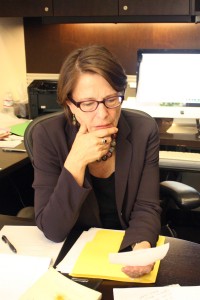Overholser reflects on her time at USC
Journalism has changed a lot in the past five years. And Geneva Overholser has worked to keep USC at the forefront of that change.

Final stretch · Geneva Overholser said she plans to stay involved with Annenberg after she leaves in June. – Rachel Bracker | Daily Trojan
During her five years as director of the journalism school at the Annenberg School for Communication and Journalism, the journalism and public relations program have shifted dramatically to adapt to the 24/7 news cycle, fueled by social media and digital storytelling.
In addition to launching several news outlets, such as Neon Tommy and Intersections, Overholser supervised an overhaul of the journalism school’s curricula.
“There’s a lot more multimedia storytelling, there’s a lot more social media, but there’s also more entrepreneurial thinking and economic literacy,” Overholser said. “Nobody’s going to reinvent journalism now unless we also reinvent how it’s funded.”
Annenberg Dean Ernest J. Wilson III said Overholser was instrumental in the restructuring of curricula.
“She was the leader of the school’s effort to restructure the curriculum to make it more relevant and responsive to today’s very dynamic conditions,” Wilson said. “And for me, she was a great partner in our jointly held slogan, ‘innovate, innovate, innovate.’”
This also applied to public relations, which was also under her purview.
“I’m very happy that we have created a climate in the journalism and public relations programs that is really very collaborative,” Overholser said emphatically. “Of course not everyone agrees on everything -— it’s a faculty. But they are very collaborative and public relations and journalism have grown to respect one another more.”
Overholser said she is almost “ironically” proud of the public relations part of the journalism school, which comprises about half of it, because the program has grown from three to eight full-time faculty as well as in the aspirations of the school’s students since she arrived at USC in 2008.
“Public relations is changing just as much as journalism,” Overholser said. “And many of our public relations students are interested in advocacy, and what used to feel like advocacy journalism to me.”
Overholser said though revising the ciricula in the School of Journalism was met with some resistance from faculty, she is very open to criticism, and she respectfully rebuts it. She is also very active in the nationwide debate about the future of journalism, and encourages others to be as well.
“I do wish more people at USC Annenberg would make their voices heard and I wish we were more prominent in social media,” Overholser said. “We do have some people who tweet a lot or are on Facebook a lot, but we should have more. We have got to be leaders in this debate.”
And Overholser said this mentality will continue to exist when she steps down in June.
“I want to continue to keep my voice in the debate about the future of journalism. Every thoughtful person who cares about journalism wants to be in that debate,” Overholser said. “I worry that it’s controlled by a fewvoices, pugnacious white guy voices. … I want us to all be in there thinking together: people of color, women, young folks, old folks.”
In 2012, Annenberg was awarded the Association for Education in Journalism and Mass Communication’s Equity and Diversity Award. This honor is a testament to Overholser’s steadfast commitment to diversity throughout her time at the university.
“I’m really proud of how diverse our faculty is and how diverse our student body is,” Overholser said. “We know that the future of journalism is not all white and it’s not all men.”
And while Overholser has been a bold voice, she also walks a tight line: She is critical without cynicism, confident without arrogance and strong without obstinance. If you chatted with her in a line at Starbucks, you would not know that she has lead a newsroom to win a Pulitzer Prize (as editor of the Des Moine Register), represented The Washington Post as ombudsman and served on The New York Times’ editorial board.
Even with this resume, Wilson said Overholser has exceeded expectations.
“When we were recruiting Geneva Overholser, we were told that she was at the very top of the field, and we were delighted when she accepted our offer. And we had very high expectations,” Wilson said. “Over the past five years, she has gone beyond even those high expectations to prove herself an innovative and effective director of the School of Journalism at the University of Southern California. And all of us owe her a great debt of gratitude.”
